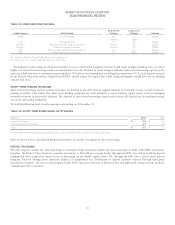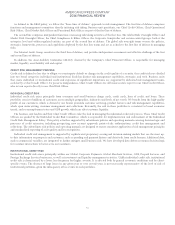American Express 2014 Annual Report Download - page 45
Download and view the complete annual report
Please find page 45 of the 2014 American Express annual report below. You can navigate through the pages in the report by either clicking on the pages listed below, or by using the keyword search tool below to find specific information within the annual report.
AMERICAN EXPRESS COMPANY
2014 FINANCIAL REVIEW
We held the following deposits as of December 31:
TABLE 23: CUSTOMER DEPOSITS
(Billions) 2014 2013
U.S. retail deposits:
Savings accounts – Direct $26.2$24.6
Certificates of deposit:(a)
Direct 0.3 0.5
Third-party 7.8 6.9
Sweep accounts – Third-party 9.0 8.9
Other retail deposits:
Non-U.S. deposits and U.S. non-interest bearing 0.2 0.1
Card Member credit balances – U.S. and non-U.S. 0.7 0.8
Total customer deposits $ 44.2 $41.8
(a) The weighted average remaining maturity and weighted average rate at issuance on the total portfolio of U.S. retail CDs, issued through direct and third-party
programs, were 29.5 months and 1.54 percent, respectively, as of December 31, 2014.
LONG-TERM DEBT PROGRAMS
During 2014, we and our subsidiaries issued debt and asset securitizations with maturities ranging from 3 to 10 years. These amounts
included approximately $5.3 billion of AAA-rated securitization certificates and notes, $0.1 billion of subordinated securities and $8.2 billion
of unsecured debt across a variety of maturities and markets. During the year, we retained approximately $0.8 billion of subordinated
securities, as the pricing and yields for these securities were not attractive compared to our other sources of financing available.
Our 2014 debt issuances were as follows:
TABLE 24: DEBT ISSUANCES
(Billions)
American Express Company:
Fixed Rate Subordinated Notes (weighted-average coupon of 3.63%) $0.6
American Express Credit Corporation:
Fixed Rate Senior Notes (weighted-average coupon of 1.76%) 5.1
Floating Rate Senior Notes (3-month LIBOR plus 42 basis points on average) 2.5
American Express Credit Account Master Trust:(a)
Fixed Rate Senior Certificates (weighted-average coupon of 1.41%) 3.5
Floating Rate Senior Certificates (1-month LIBOR plus 35 basis points on average) 1.8
Floating Rate Subordinated Certificates (1-month LIBOR plus 49 basis points on average) 0.1
Total $13.6
(a) Issuances from the American Express Credit Account Master Trust (the Lending Trust) do not include $0.8 billion of subordinated securities retained by us
during the year.
ASSET SECURITIZATION PROGRAMS
We periodically securitize Card Member receivables and loans arising from our card business, as the securitization market provides us with
cost-effective funding. Securitization of Card Member receivables and loans is accomplished through the transfer of those assets to a trust,
which in turn issues securities collateralized by the transferred assets to third party investors. The proceeds from issuance are distributed to
us, through our wholly owned subsidiaries, as consideration for the transferred assets.
The receivables and loans being securitized are reported as assets on our Consolidated Balance Sheets and the related securities issued to
third-party investors are reported as long-term debt.
Under the respective terms of the securitization trust agreements, the occurrence of certain triggering events associated with the
performance of the assets of each trust could result in payment of trust expenses, establishment of reserve funds, or in a worst-case scenario,
early amortization of investor securities. During the twelve months ended December 31, 2014, no such triggering events occurred.
45
























